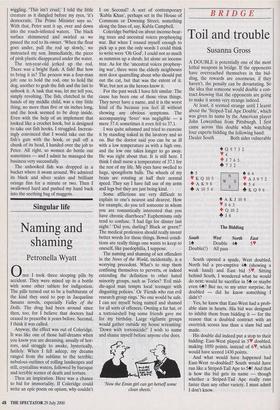BRIDGE
Toil and trouble
Susanna Gross
A DOUBLE is potentially one of the most lethal weapons in bridge. If the opponents have overreached themselves in the bid- ding, the rewards are enormous; if they haven't, the penalty can be devastating. So the idea that someone would double a con- tract knowing that the opponents are going to make it seems very strange indeed.
At least, it seemed strange until I learnt about the 'Striped-Tail Ape Double', which was given its name by the American player John Lowenthan from Pittsburgh. I first came across this double while watching four experts bidding the following hand: Dealer South 4 5 VKQ105
• A K 9 8 # A 10 5 4
Both 4 Q 9 7 9, 4
♦ J 7 6 3 # 7 3 2
sides vulnerable 3 2 4 6 4
A J 9 7 2 ♦ 5 4 # K Q 9 6 N W
S
E
4 A K J 10 8
✓ 8 6 3 • Q 10 2 # J 8 The Bidding South West North East
14 Double 44 5V Double(!) All pass South opened a spade, West doubled, North bid a pre-emptive 44 (showing a weak hand) and East bid 5V. Sitting behind South, I wondered what he would do next: would he sacrifice in 54 or maybe even 64? But no, to my utter surprise, he doubled — did he know something I didn't?
Yes, he knew that East-West had a prob- able slam in hearts. His bid was designed to inhibit them from bidding it — for the reason that a doubled contract with an overtrick scores less than a slam bid and made.
His double did indeed put a stop to their bidding: East-West played in 5V doubled, making 1050 points, instead of 6V, which would have scored 1430 points.
And what would have happened had East-West re-doubled? South would have run like a Striped-Tail Ape to 54! And that is how the bid gets its name — though whether a Striped-Tail Ape really runs faster than any other variety, I must admit I don't know.


























































 Previous page
Previous page